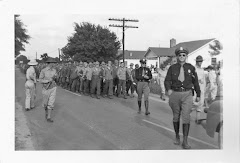 Those of you who have read Guests Behind the Barbed Wire probably remember the army captain who came to Camp Aliceville in December 1942 to set up the medical service for the POW camp. He took a room in the home of Miss Annie Mae Coleman over in Carrollton and began hiring hospital employees. One of the first was Elma Henders, who left college to become the Station Hospital dietician.
Those of you who have read Guests Behind the Barbed Wire probably remember the army captain who came to Camp Aliceville in December 1942 to set up the medical service for the POW camp. He took a room in the home of Miss Annie Mae Coleman over in Carrollton and began hiring hospital employees. One of the first was Elma Henders, who left college to become the Station Hospital dietician.By mid-April 1943, Captain Arthur John Klippen, M. D., had the Station Hospital open and ready for patients. It was a 250-bed facility designed to treat American military personnel as well as POWs. In emergencies, it even treated local Aliceville residents.
Captain Klippen supervised the treatment of many war-weary and disillusioned German soldiers who arrived at Camp Aliceville in the coming months. One of them was Horst Uhse who had battled jaundice and malaria in makeshift transfer camps in North Africa. In later years, Uhse expressed his appreciation for the professionalism of Captain Klippen and his staff who nursed him back to health before transferring him to Compound B of Camp Aliceville.
One German POW was not so lucky. Otto Ulrich cut his leg on a piece of wire fencing at a compound athletic field and waited too long to report his injury It became infected and developed gangrene. When Ulrich finally entered the camp hospital, Captain Klippen recommended amputation, but the POW refused and died.
The photo at upper left was sent by Captain Klippen's son Chris who recently discovered the existence of the Aliceville Museum http://www.cityofaliceville.com (Click on POW Museum). The photo shows Captain Klippen with his older son Art (Arthur G. Klippen) and was taken in Aliceville in May 1944. The photo was given to Chris by his sister Nina.
Captain Klippen was born in 1909 in Duluth, MN to immigrant parents from Norway. He earned a Master's degree in chemistry and taught at a junior college before deciding to study medicine. He received his degree from the medical school at St. Louis University in 1938 and, like many medical students at the time, accepted a commission in the Armed Forces.
Captain Klippen's first duty was to sit on a medical draft board. He traveled throughout the south and met his wife, Zora Grijack, at Fort Benning, GA in 1940. Zora was a lieutenant in the Army Nursing Corps and scheduled to go to the Phillipines when she resigned her commission to marry Klippen. Many of her nursing friends who did go on to be stationed in the Philippines were there when the island fell to the Japanese and were held in brutal POW camps until the American liberation later in the war.
Following Captain Klippen's service as Medical Officer at Camp Aliceville, he received orders to the Pacific in anticipation of the invasion of Japan. He was on a ship headed to the Pacific Theater when the atom bombs were dropped and the war ended.
After the war, Klippen was in private practice as a family physician in Michigan. In 1955, he began work for the VA medical centers, working in the Central Office in Washington, D.C. and then serving as Hospital Director for the Ann Arbor (Michigan) VA. In 1969, he transferred to the Minnesota VA and retired there as Hospital Director in 1977. He and Zora lived in Maple Lake, MN until his death in October 1997. Zora died in 2001.
The child in the photograph above, Arthur G. klippen, served in the US Army as a second lieutenant in Vietnam. He was killed in action on August 25, 1966 and was posthumously awarded the Silver Star for "gallantry in combat." It is fitting that he and his parents, who served their country well, are buried together in the same plot in Arlington National Cemetery.
Chris Klippen is donating an oil painting to the Aliceville Museum. It was created by one of the German POWs and given to his father. The painting, done on the back of a piece of military posterboard, shows the recreation area and barracks of Camp Aliceville.
A SIDE NOTE: Chris Klippen, Mary Bess Paluzzi (Director of the Aliceville Museum), and I share a common bond. All three of our fathers were scheduled to be involved in the invasion of Japan at the time the atomic bombs were dropped on Hiroshima and Nagasaki. Mary Bess's father had been badly wounded in Europe in November 1944 and was just being released again for active duty when he expected to be reassigned to the Pacific. Chris's father was on a ship headed to the South Pacific for the invasion of Japan, and my father (see Introduction to Guests Behind the Barbed Wire) was already stationed at Okinawa and training for that invasion.






No comments:
Post a Comment